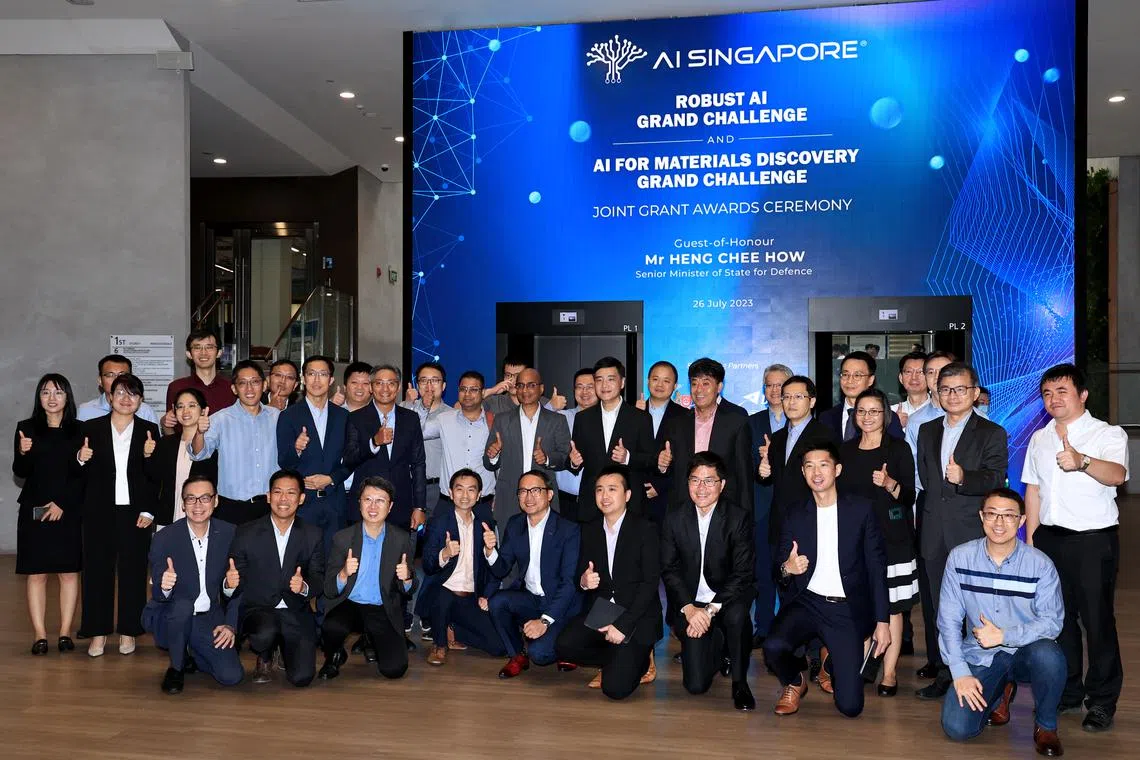$20m grant set up to develop AI in self-driving vehicles, materials research for military, commercial uses
Sign up now: Get ST's newsletters delivered to your inbox

Funded by AI Singapore, the pot will be split among five research teams from industry players and universities in Singapore and overseas.
PHOTO: LIANHE ZAOBAO
SINGAPORE – Self-driving military vehicles and machinery can be dangerous if robot eyes fail to recognise objects clearly in bad weather – or worse, if the systems are hacked.
These are among the scenarios that a $20 million artificial intelligence (AI) research challenge aims to solve.
The initiative is funded by AI Singapore, working in tandem with the Ministry of Defence (Mindef), and it marks the first collaboration of its kind with local researchers in the field of AI.
The aim is to develop AI tools for military and commercial uses, AI Singapore announced on Wednesday at the National University of Singapore (NUS) innovation4.0 building, home to NUS’ tech research projects.
The $20 million pot will be split among five research teams from industry players and universities in Singapore and abroad.
Three of the teams will develop AI systems for autonomous vehicles. The other two teams will work on generative AI – the technology used to create ChatGPT – that can concoct new materials to be used in military equipment.
In the presentations of their proposals, the teams showed examples of how self-driving vehicle sensors can be confused by lights flickering across road signs or bad weather. The teams will develop AI systems that can better recognise signs and operate more reliably in the real world to make autonomous vehicles safer.
Military equipment tend to have more stringent safety and reliability requirements than what is available in the market, said AI Singapore deputy executive chairman Mohan Kankanhalli, who announced the research funding.
In the case of autonomous vehicles, “many have vulnerabilities that have not been fully explored or addressed”, said Professor Mohan. “(The challenge) will imagine and create potential adversarial situations for the AI to train it to be more robust.”
A truly autonomous vehicle is likely still some years away, but the research can help develop new AI tools to help drivers, he said.
The other two groups will explore generative AI tools that can help discover new materials by simulating the mixing of metals and elements to form stronger and lighter materials.
“In a lab, it will take forever to create new materials, but with AI, we can simulate many of the experiments,” said Prof Mohan. “It is going to be an experiment discovery system that assists scientists to come up with desired materials much faster.”
Dr Teow Loo Nin, chief engineer of DSO National Laboratories, who was one of the designers of the research challenge, said the research will enhance the robustness of AI applications in defence, protecting systems from potential attacks.
The study could also support existing capabilities that are used in our unmanned vehicles, he added.
DSO develops military technologies, including systems for robots such as the dog-like Harrier that is used for scouting in urban areas, and the Foxhound, a larger, unmanned vehicle on wheels.
In his opening address during the announcement of the grant on Wednesday, Senior Minister of State for Defence Heng Chee How said the study will help to deploy AI in the military’s war-fighting and organisational needs.
He cited some challenges in using AI, including its proneness to make up facts – or “hallucinate” – which can have dire consequences in real-world operations. The databases used to power AI also need to be sound to prevent biased decision-making.
Mindef’s investment in AI will continue to grow, and it will work with global and local industry players, involving large tech companies as well as research teams, he added.
Listing ways that the military is seeking to deploy AI, Mr Heng said: “The army, for example, will be (supported) with unmanned ground vehicles for logistics support, and this will free up precious manpower for other important tasks.
“The digital and intelligence service is actively employing detection analytics to hunt cyber threats for the Singapore Armed Forces and to address servicemen’s attrition.”
In addition, the Republic of Singapore Air Force is developing automatic detection and classification of runway damage with the use of drones, and the navy has deployed coastal security systems with advanced video analytics to spot objects such as small boats or swimmers in the distance.


